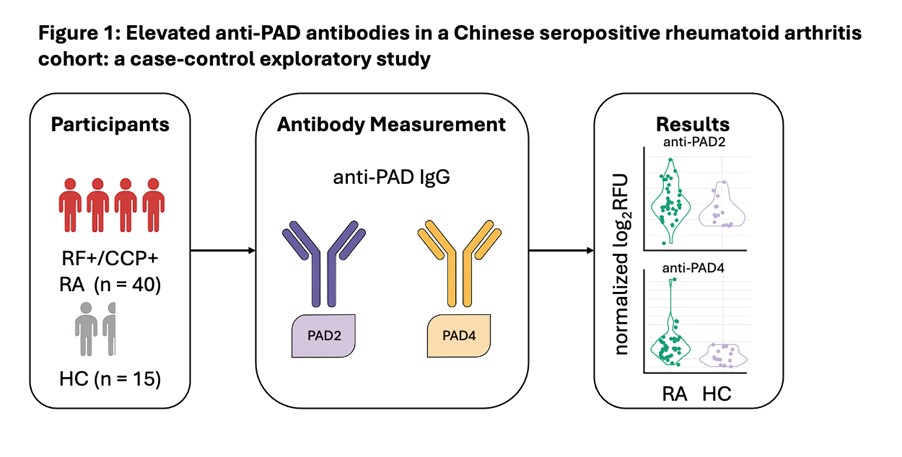Session Information
Date: Tuesday, October 28, 2025
Title: (2227–2264) Rheumatoid Arthritis – Diagnosis, Manifestations, and Outcomes Poster III
Session Type: Poster Session C
Session Time: 10:30AM-12:30PM
Background/Purpose: Autoantibody-based biomarkers including ACPA and RF are of established clinical use in rheumatoid arthritis (RA) and are ingrained in international classification criteria. However, other antibodies are also likely to be of relevance. The presence of autoantibodies in Chinese RA populations has not been well studied. The aim of this study was to determine an autoantibody signature in a homogenous population of ACPA/RF-positive Chinese RA patients by using a broad explorative screen of IgG antibodies to autoantigen specificities.
Methods: We selected 40 RA patients and 10 matched healthy controls. Plasma samples were screened only for IgG seroreactivity, against a panel of >1,800 protein autoantigens using the KREX technology-based i-Ome Discovery array. Differential analysis was performed using R package limma. The significance threshold for identifying differential Abs (DAbs) was set at p < 0.05 and |fold-change| > 1.1. ROC analysis was carried out for each DEAb, yielding discriminative performance metrics e.g., sensitivity, specificity, area under the curve (AUC), and accuracy.
Results: Anti-PAD2 and anti-PAD4 autoantibodies exhibited significantly higher signals in the RA class. Class-wise, anti-PAD4 exhibited a fold-change of 1.54 (p = 5.46e-3), while anti-PAD2 exhibited a fold-change of 1.22 (p = 3.9e-2). Because only a proportion of individuals within a target class typically exhibits the signal of interest, class-wise autoantibody fold-changes are often diluted, and are therefore still meaningful at a threshold of 1.20. Both autoantibodies exhibited good sensitivity in discriminating RA from HC (0.90 and 0.74, respectively), although specificities were moderate (0.60 and 0.67, respectively). The ROC AUC were 0.79 for anti-PAD4 and 0.69 for anti-PAD2.
Conclusion: PAD2 and PAD4 have been reported as the most strongly implicated PAD enzymes in RA pathogenesis on the basis of genetic, histological and animal studies (1). In addition, anti-PAD4 antibodies are associated with severe joint damage, and anti-PAD2 antibodies are associated lung involvement but less severe joint disease (1). Elevated anti-PAD2 and anti-PAD4 autoantibody prevalence in our Singaporean Chinese RA patients are consistent with Western cohort findings (1,2), as well as a China cohort (3). This supports the diagnostic relevance of these autoantibodies beyond Western populations and highlight the potential role of PAD 2/4 autoantibodies to enhance early RA diagnosis and prognosis in a Singaporean Chinese population.< !(1) Curran, A.M., Naik, P., Giles, J.T. et al. PAD enzymes in rheumatoid arthritis: pathogenic effectors and autoimmune targets. Nat Rev Rheumatol 16, 301–315 (2020)< ((2) Martinez-Prat L et al. Autoantibodies to protein-arginine deiminase (PAD) 4 in rheumatoid arthritis: immunological and clinical significance, and potential for precision medicine. Expert Rev Clin Immunol. 2019 Oct;15(10):1073-1087(C(2) Clinical relevance of autoantibodies targeting peptidylarginine deiminases 2 and 4 in rheumatoid arthritis Minghua ZHAN; Huizhang BAO; Jiali CHEN; Changsheng XIA; Chunhong FAN; Yudong LIU. Chinese Journal of Laboratory Medicine ; (12): 1035-1042, 2021
To cite this abstract in AMA style:
Ma M, Leong K, koh e, Dhanasekaran P, peyper j, abylova b, Mak A, Cheung P. Elevated Anti-PAD Autoantibodies in a Singaporean Chinese Rheumatoid Arthritis (RA) Cohort with Rheumatoid Factor (RF) and Anti-Citrullinated Protein Antibodies (ACPA) Positivity: A Case-control Exploratory Study [abstract]. Arthritis Rheumatol. 2025; 77 (suppl 9). https://acrabstracts.org/abstract/elevated-anti-pad-autoantibodies-in-a-singaporean-chinese-rheumatoid-arthritis-ra-cohort-with-rheumatoid-factor-rf-and-anti-citrullinated-protein-antibodies-acpa-positivity-a-case-control-explo/. Accessed .« Back to ACR Convergence 2025
ACR Meeting Abstracts - https://acrabstracts.org/abstract/elevated-anti-pad-autoantibodies-in-a-singaporean-chinese-rheumatoid-arthritis-ra-cohort-with-rheumatoid-factor-rf-and-anti-citrullinated-protein-antibodies-acpa-positivity-a-case-control-explo/

